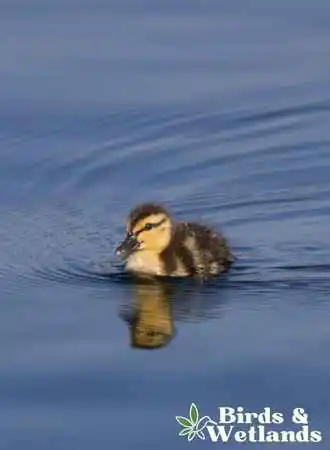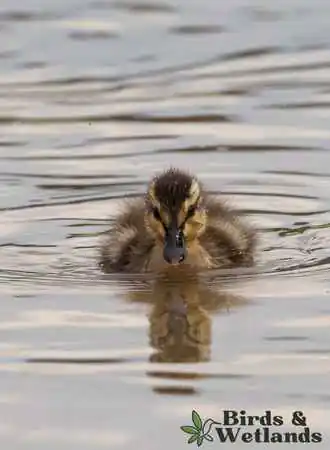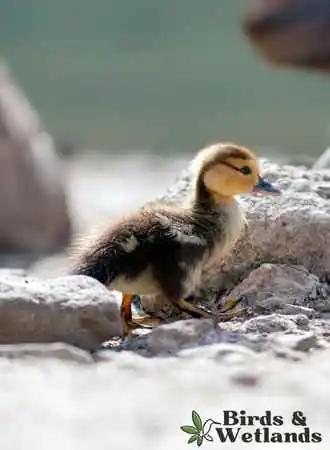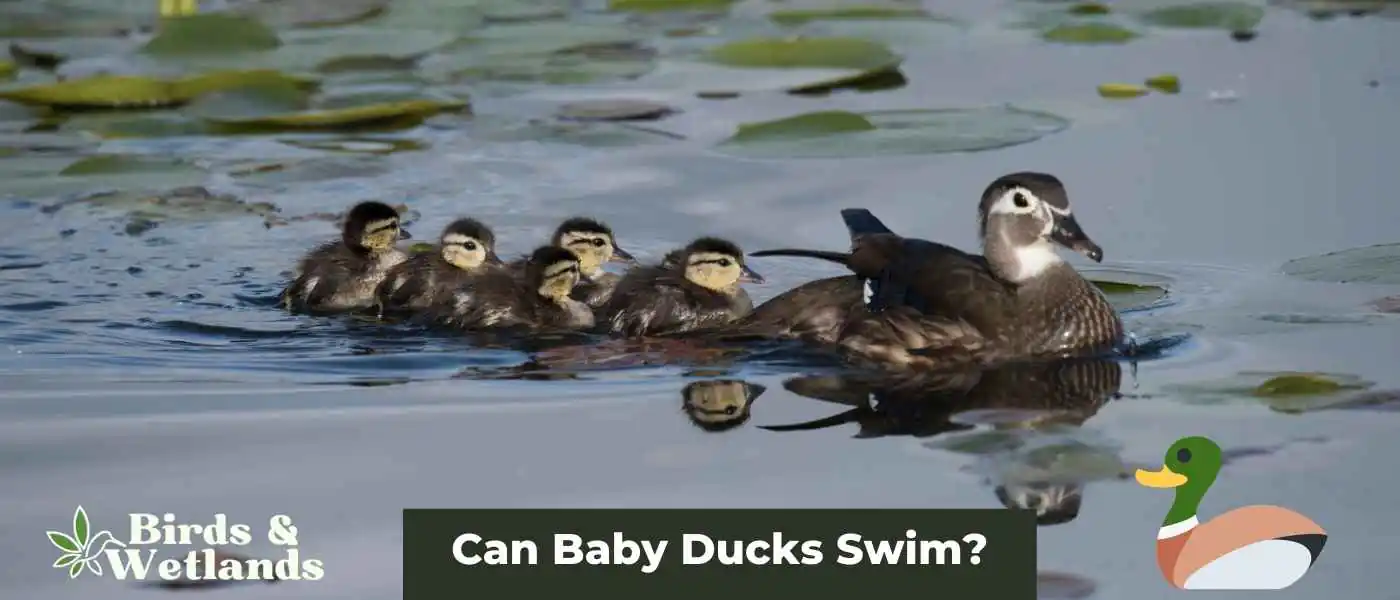We all know that ducks are amazing creatures capable of incredible feats.
But can baby ducks can swim as well?
Yes, baby ducks, or ducklings, are capable of swimming shortly after hatching. They have a special waterproofing oil that their mother applies to them which keeps them buoyant and insulated from the cold water.
However, without their mother, they may lose this waterproofing and can become waterlogged and chilled, which can be dangerous.
Key Takeaways on Can Baby Ducks Swim
- Ducklings can start learning to swim from one week old. However, the learning process varies if they are in the wild versus being raised in captivity.
- To swim effectively, ducks need waterproof feathers, a feature provided by a special oil called preen oil. Ducklings do not produce this oil and depend on their mother for it in the wild.
- Ducklings aren’t able to swim independently until they’re between seven to nine weeks old. This is when their feathers have fully grown.
- Baby ducks can drown as they are not as buoyant as adult ducks and lack the necessary waterproofing. Thus, supervision during water play is vital.
- Despite their affinity for water, it’s important to ensure the water isn’t too deep or too cold for ducklings to prevent drowning or hypothermia.
- If you’re raising ducks, they can be let outside when they’re about three to five weeks old, but only if they have grown some feathers and weather conditions are suitable. Otherwise, they risk getting cold, which can lead to illness or death.
- While ducklings enjoy water, a pool isn’t necessary. A water bowl suffices for both drinking and playing.
Can Young Ducklings Swim?

Yes, baby ducks can swim. They should start dabbling in the water at one week old with adult ducks. Baby ducks have strong instinctive swimming skills inherent in all waterfowl, allowing them to stay afloat with little effort.
However, baby ducks do not have fully developed feathers or waterproofing for their feathers until they are about 4-5 weeks old. Grown ducks have oil glands that help them waterproof their feathers. Ducklings can swim because their mother secretes this special oil.
| Age (Weeks) | Development Stage | Behavioral Changes | Potential Risks | Caregiver Actions |
|---|---|---|---|---|
| 1 | Introduction to water | Ducklings start exploring their aquatic environment. | Risk of drowning if left unsupervised. | Supervise ducklings during their initial encounters with water. |
| 1-7 | Dependence on Mother’s Preen Oil | Ducklings begin to swim, following their mother closely in the wild. In captivity, they are still learning and adjusting to the water. | Without the mother’s preen oil, ducklings in captivity may not float well and could drown. | Monitor swimming sessions closely. Provide shallow water for the ducklings to prevent drowning. |
| 7-9 | Independent Swimming | Ducklings become confident swimmers, exploring water more independently. | Overconfidence may lead to them venturing into deeper water and potentially getting into danger. | Continue supervision but start to lessen the intensity as they become more capable. |
| 3-5 | Introduction to Outdoor Environment | Ducklings start exploring outdoor environments, including bodies of water. | Exposure to cold or harsh weather conditions can lead to illness or death. Predators are also a risk. | Ensure ducklings have grown some feathers before they are let outside. Monitor weather conditions and provide a safe shelter. Always supervise outdoor excursions. |
As a result, newborn ducklings may require additional support and supervision during their first month of life, particularly when learning to swim. Also, introducing your new ducklings to water at an early age encourages preening and oil production from their own oil gland.
If it’s your baby ducks’ first time in the water, fill a little tub or kiddie pool with warm water, deep enough for them not to drown (about an inch or two).
How Do Baby Ducks Learn How to Swim?
Ducks are water birds, so they must spend most of their waking hours in or near the water with other ducks. To survive in their environment, they, like other animals, must learn certain skills, including the ability to swim.
Swimming can help ducks get around and find food sources and provide the exercise they require to stay healthy. Young ducks may have a natural propensity for swimming, but most will need some guidance and encouragement to learn this important skill.
Learning to swim usually begins with ducklings frolicking in the water, practicing underwater movements and becoming acquainted with their surroundings.
However, as ducklings get older and their feathers grow, they gain more buoyancy. At this point, it is up to the mother duck to assist her little ones in developing their swimming abilities. She will gradually lead them to deeper waters where they can freely float and paddle without being overwhelmed by currents or waves.
Eventually, your baby ducks will have the ability to produce their own oil for repelling water. They will spend a significant amount of their time preening themselves. And once they are fully feathered, they can spend long periods in the water.
Baby ducks can only venture out on their own after they have mastered this skill. As a result, mother ducks are critical in teaching baby ducks how to survive and thrive in the vast world of water.
Can Baby Ducks Swim in Cold Water?
Yes, baby ducks can swim in cold water if safe conditions are met.
Baby ducks require a specific water temperature range to let them swim comfortably and effectively, so the water should not be too cold.
Furthermore, the ducklings must be able to easily locate their heat lamp to rewarm themselves if they become too cold. This is especially important in colder environments where baby ducks may struggle to retain body heat in their first few weeks.
So, before letting your baby ducks take a plunge in cold water, ensure to provide them with adequate care and attention.
When Can Baby Ducks Swim?

Baby ducks require proper care and attention, especially during their developmental stages. Wait for at least a week before letting your ducklings take their first plunge in the water. However, it must be done carefully and with extreme caution.
Ducklings are sensitive to temperature changes, so the water should not be too cold, and they should be able to easily reach their heat lamp to warm up in between swims.
Furthermore, the water must not be too deep or turbulent for ducklings to walk in and out when necessary easily.
Baby ducks can quickly become proficient swimmers with proper care and frequent monitoring, allowing them to thrive in their natural environment.
How Long Can Baby Ducks Stay in the Water?
One of the most important factors to consider regarding baby ducks and their water needs is how long they can stay in the water. Younger ducklings can remain in the water for up to 15 minutes without tiring.
However, this will vary depending on various factors, including temperature and diet. Young ducks should always be supervised in the water, as a tired duckling with no waterproofing can easily drown.
To avoid this, thoroughly dry any baby ducks before returning them to the brooder. This will help to prevent them from becoming too cold and developing hypothermia.
Can Baby Ducks Drown?
Yes, baby ducks can drown. Young ducks are not yet waterproof and don’t have adult feathers, making them vulnerable to drowning, especially if the water level is high.
When it’s time for them to rest, the mother duck will lead her baby ducks out of the water. The adult duck knows when it’s time for her ducklings to return to the land and will call them out of the water before they become waterlogged or chilled.
Of course, if a mother duck becomes separated from her babies or cannot lead them, they can drown if they remain in the water for too long.
Although uncommon, a male duck may drown a duckling if the drake feels threatened by it.
At about five weeks, ducklings will eventually learn how to preen and spread their owl oil to their feathers to make them waterproof.
Can Baby Ducks Swim Underwater?

Baby ducks can easily float on the surface of the water, but they are not nearly as adept at swimming underwater. They lack the strong muscle control that adult ducks use for underwater propulsion.
FAQs on Raising Ducks and Ducklings
Do Ducklings Need a Pool?
Ducklings are waterfowl, so naturally, they are attracted to water. While these young birds do love water, they don’t necessarily need a pool.
While pools are certainly beneficial to young domestic ducks, they can also thrive without one. They will be fine if they can access a simple bucket or chicken drinker. This allows them to splash and have fun in the water whenever they want and fulfills their natural desire to dip their heads beneath the surface.
A small pond or stream nearby can also help meet their needs. Ultimately, what matters most to ducks is having regular access to bodies of water where they can swim and play at their leisure.
Do Ducklings Love Water?
Yes, ducklings love water. After all, they are waterfowl, and their love of water is a fundamental part of their nature.
As they grow older, wild ducks may simply adapt to their aquatic environment as they grow. Ducks can be found near bodies of water early in their lives when they huddle together to keep warm and safe from predators. They develop no preference for the water over dry land as they become accustomed to life on or near the water’s edge.
Overall, it appears that ducks’ apparent love of water is due to location and experience rather than anything else.
Why Do You Need to Keep Your Ducklings Warm After Swimming?

Ducklings are extremely vulnerable and require special care to survive. Keeping ducklings warm, especially after swimming, is one of the most important aspects of duckling care.
Ducklings can become very cold and hypothermic after being in the water, leading to various health complications and even death.
Drying off your ducklings and providing extra warmth with a heated light or hot pad to keep them from getting cold should be a priority.
It would be best if you also were on the lookout for any changes in behavior or appearance that could indicate that your ducklings are too cold.


